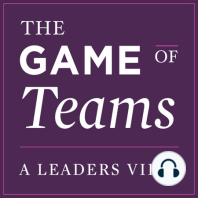29 min listen

A Conversation with Donna Zajonc & David Emerald on the Game of Teams Podcast series
A Conversation with Donna Zajonc & David Emerald on the Game of Teams Podcast series
ratings:
Length:
49 minutes
Released:
May 15, 2019
Format:
Podcast episode
Description
Introduction: David Emerald and Donna Zajonc are a husband and wife team and also business partners & founders of the Bainbridge Leadership Center. David is the author of the best selling book The Power of Ted and has recently published his second book called 3 vital questions, transforming workplace drama. Donna is a Master Certified Coach and together they teach, facilitate and speak to the power of TED and the 3 Vital Questions framework to transform workplace drama. Podcast episode summary: This episode describes what it means to be human and how we succumb to drama. Stephen Karpman described a social model of human interaction called the drama triangle. As humans in reaction to problems we often jump onto the drama triangle and assume one of three roles, the Victim, Persecutor or Rescuer. The antidote is another triangle, called The Empowerment Dynamic or TED, which speaks to our inherent capacity to be creative. Three roles comprise TED, the Creator, Challenger and Coach. David’s next book Three Vital Questions is set in an organisational context and speaks to how we are thinking, relating and acting in our business, often informed by our way of being in our personal lives. TED can be described as a self-Leadership book and the 3 Vital Questions an answer to our Leadership and teamwork choices in work. David and Donna share the auspices of their books, the motivation behind the writing and share what each involves through the course of this episode. Each book is a very digestible fable that perhaps masks the inherent complexity and nuances behind the material. This is not a Pollyanna type answer to drama but a conscious consciousness and call for us to wake up to our patterns and begin to exercise choice. Donna and David liken themselves to translators condensing complex human conditions into digestible and applicable frameworks David started by sharing our very essence is as creators. We have the capacity to be in choice about the outcomes we want, to think about how we are thinking and to raise our awareness about how we are relating to others and ourselves. We then create by taking baby steps. The core of what David and Donna teach is shifting from a set of relations/roles and dynamic in the dreaded drama triangle or DDT for short when we are in the dance of Victim, Persecutor and Rescuer to a more empowering set of relations/roles or dynamic called TED. In order to develop our inherent capacity as creators we can cultivate the antidote roles of Creator, Challenger and Coach called TED. We have an internal DDT triangle and TED available to us as well as these roles in relation to others. A good start is to self diagnose how we relate to ourselves and then learn to pause, stop and allow for the whisperer creator to emerge. Do not be numb or seduced by the inherent simplicity of the models they belie a lot of unconscious unravelling and neurological wiring. The roles are dynamic but the triangles serve to depict a static depiction of dynamic reality. Once we can notice we have the capacity to shift and alter our operational models. These roles can be enacted by organisations in the culture they create, between sub-groups or functions and of course on teams as well. Donna shared a story of a team who once they understood the DDT and the choice to pursue TED they were able to first change the language on their website that was predominantly problem focused. The work moving from DDT to TED is not simplistic or “Pollyannaesque” The work is often beset with problems. The trick is to first outline what outcome/purpose/mission the team wants to achieve and then enumerate the problems to be encountered in service of an outcome Problem-solving is still part of the work but the difference is we are not reacting to problems coming at us. The important role of Coach on TED. People are very able to tell you what they don't want but less able to articulate what they desire or really want. A Leader or leader as a coach ca
Released:
May 15, 2019
Format:
Podcast episode
Titles in the series (98)
A Conversation with Fin Goulding on the Game of Teams Podcast series: What it means to be agile by The Game of Teams